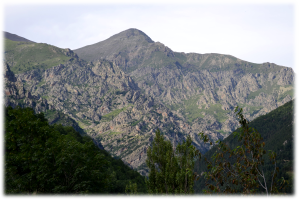Spanish culture
Spain is a country rich in culture and history, but spiritually bankrupt.
Facts
- Spain’s population is quickly approaching
 48,000,000 people, largely due to rapidly increasing immigration. It is the 2nd largest country in Western Europe.
48,000,000 people, largely due to rapidly increasing immigration. It is the 2nd largest country in Western Europe. - There are 17 regions, 50 provinces and around 8,105 cities, towns and villages in Spain.
- While the official language is Castilian Spanish, there are four major languages spoken in the country: Spanish, Catalan, Basque, and Gallego. In Catalunya, where L’Arcada is located, the native language is Catalan.
- Spain is considered the second most mountainous country in Europe.
- The median age is around 40 years old for both men and women.
- Spain leads Europe in AIDS, drug problems and abortions.
- 80% of young adults consider cohabitation to be a favorable alternative to marriage.
- Only 1% of Spaniards consider religion as one of their three most important values.
History
 Spain was dominated and controlled by Rome during the time of Christ.
Spain was dominated and controlled by Rome during the time of Christ.- Muslim Moors from North Africa invaded in 711 to rule until 1492, the same year Columbus sailed to the new world.
- Spain grew to be the mightiest economic power in the world during the 16th century, but then declined and stagnated over the next three centuries.
- From 1939-1975 (36 years) Spain was ruled by a dictator, General Franco.
- Spain became a democratic monarchy when Franco’s successor, Juan Carlos de Borbon, came to power.
- The new democracy, as well as the inclusion of Spain into the European Union in 1986, has helped to transform Spain into a modern, confident, industrial power with rising living standards.
Climate and Economy
- The climate varies significantly in the different parts of Spain,
 often as a result of major differences in altitude. Average temperature in January is 45-50 degrees, and summertime temperatures vary from 75-105 degrees.
often as a result of major differences in altitude. Average temperature in January is 45-50 degrees, and summertime temperatures vary from 75-105 degrees. - Tourism is Spain’s greatest source of income, followed by industry and agriculture. Over 70 million tourists flock into Spain each year to enjoy the coastal, mountain and urban areas.
- Spain is the world’s largest producer of olive oil and Europe’s largest producer of lemons, oranges, and strawberries. Spain also produces large crops of wheat, barley, vegetables, tomatoes, olives, sugar beets, citrus fruit, and grapes.
- Spain has made great economic progress in recent decades, but it still lags behind most of Western Europe. Currently, Spain’s unemployment rate is at 16%.
- The increasing influx of immigrants contributes to the economic difficulties Spain is facing.
Spiritual Climate
 Spain has had a complex relationship with religion. Its history is full of religiously motivated wars.
Spain has had a complex relationship with religion. Its history is full of religiously motivated wars.- There used to be a saying that “Spain is more Catholic than the Pope.” Catholic traditions formed the foundation of major life events from the birth of a baby to marriage and death and included many holidays and festivals throughout the year.
- Today, only a small number are true Roman Catholics. The Church in Spain is tainted in people’s minds by the tyranny of the Inquisition in the 16th century, its association with the Franco regime, as well as growing distrust and feelings of injustice due to numerous issues, including moral dilemmas among church leaders and recognition of the incredible quantity of possessions belonging to the Roman Catholic Church (finances and property), contrasting drastically with the overall economic state of Spain and Spaniards.
- Although 80% profess to be Roman Catholic, less than 10% continue to practice Roman Catholicism today.
- Studies have shown that there are well over 300 cults in Spain, which has resulted in creating even more confusion and fear regarding religion. This likely contributes to the decision of many Spaniards to discount anything that even slightly relates to religion, God, church, and the Bible.
- A 2010 study listed 61 known satanic groups in Spain.
- Immigration has resulted in resurgence of the presence of Islam. As of 2019, it was estimated that around 2.1 million Muslims lived in Spain, and that number continues to grow.
- Catalunya is home to the majority of Muslim immigrants.
- The Bible has been a prohibited book for most of the last 500 years and it was not until 1977 that a good measure of religious liberty was granted.
- Spain continues to be one of the least evangelized countries in the world.
- Only 1% of the people of Spain have a personal relationship with Jesus Christ.
- Out of a population of 48 million, about 150,000 are evangelicals and of Spain’s 8,105 cities and towns, around 7,500 towns have no evangelical church.

with no comments yet.
 Follow
Follow